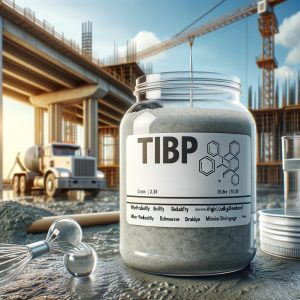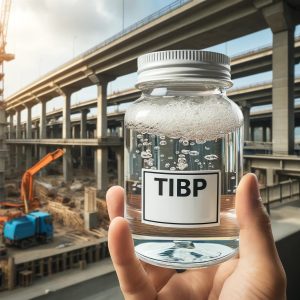Triisobutyl Phosphate: Enhancing Durability and Performance in Construction MaterialsTriisobutyl Phosphate: Enhancing Durability and Performance in Construction Materials
 In construction, where the durability and performance of materials are paramount, chemical additives play a crucial role in achieving superior results. One such versatile and effective additive is Triisobutyl Phosphate (TIBP). This article explores the significant benefits of TIBP in enhancing construction materials, focusing on its role in improving concrete admixtures, which are essential for modern infrastructure projects.
In construction, where the durability and performance of materials are paramount, chemical additives play a crucial role in achieving superior results. One such versatile and effective additive is Triisobutyl Phosphate (TIBP). This article explores the significant benefits of TIBP in enhancing construction materials, focusing on its role in improving concrete admixtures, which are essential for modern infrastructure projects.
What is Triisobutyl Phosphate?
Triisobutyl Phosphate is an organic chemical compound known for its excellent solvency properties. TIBP is widely used in various industrial applications, including as a plasticizer, a defoaming agent, and a solvent for various chemical processes. However, its application in construction, particularly in concrete admixtures, has garnered considerable attention due to its ability to enhance the performance and longevity of concrete structures.
The Role of TIBP in Concrete Admixtures
Concrete admixtures are added to concrete before or during mixing to modify its properties and enhance performance. TIBP is particularly effective in this regard, offering several benefits that are critical for construction projects:
- Improved Workability: TIBP enhances the workability of concrete, making it easier to mix, transport, and place. This is especially important for large-scale infrastructure projects where the ease of concrete handling can significantly impact construction efficiency and speed.
- Reduced Water Demand: By acting as a plasticizer, TIBP reduces the water demand in concrete mixtures. Lower water content leads to higher strength and durability of the finished concrete, as excessive water can weaken the concrete matrix and lead to issues like shrinkage and cracking.
- Enhanced Durability: One of the most critical aspects of construction materials is their durability. TIBP helps create a more cohesive and less permeable concrete structure, enhancing its resistance to environmental factors such as moisture, chemicals, and temperature fluctuations. This results in longer-lasting structures that require less maintenance and repair over time.
- Minimized Shrinkage: Concrete shrinkage is a common issue that can lead to cracking and structural weaknesses. TIBP helps minimize shrinkage by improving the hydration process and reducing the evaporation rate of water from the concrete mix, thus ensuring a more stable and resilient structure.
- Defoaming Properties: TIBP also acts as an effective defoaming agent, reducing the air entrapped in the concrete mix. This leads to a denser and stronger final product, essential for high-load-bearing applications such as bridges, highways, and commercial buildings.
Applications in Construction
The benefits of TIBP in concrete admixtures extend to a wide range of construction applications. From residential buildings to large infrastructure projects like bridges, dams, and highways, using TIBP can significantly enhance the performance and longevity of concrete structures. Its ability to improve workability, reduce water demand, and increase durability makes it an invaluable additive for construction professionals seeking to build resilient and enduring structures.

Conclusion
In conclusion, Triisobutyl Phosphate (TIBP) stands out as a powerful additive in the construction industry, particularly in formulating concrete admixtures. Its ability to enhance workability, reduce water demand, improve durability, minimize shrinkage, and provide defoaming properties makes it an essential component for high-quality construction materials. By incorporating TIBP into their concrete mixtures, construction professionals can achieve superior performance and longevity in their projects, ultimately contributing to the development of stronger and more durable infrastructure.